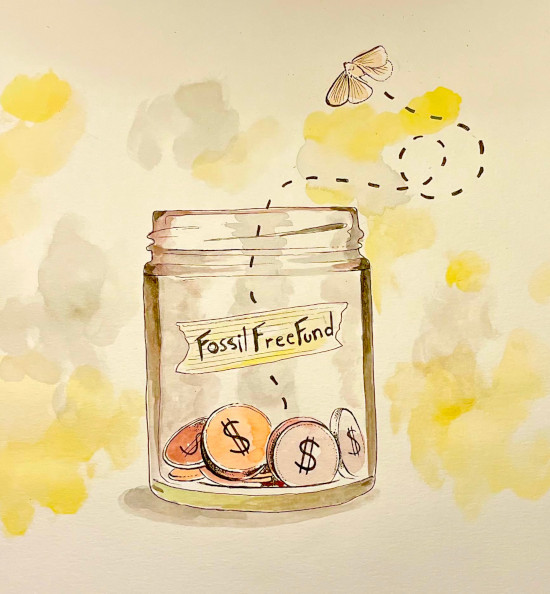U of W Foundation embraces Net Zero, but not divestment
Endowment fund commits to net-zero greenhouse-gas emissions by 2050

Illustration by Gabrielle Funk
The University of Winnipeg (U of W) Foundation, which oversees the U of W’s $82 million endowment fund, has committed to ensuring its investment portfolio is “aligned with net-zero emissions” by 2050 or sooner.
The firm managing the endowment fund, MFS Investment Management (MFS), signed on to the Net Zero Asset Managers (NZAM) initiative in 2021, in response to pressure from the foundation and other clients to deepen its commitment to addressing climate change.
An endowment fund is a large pool of lowrisk investments owned by a university or other non-profit organization. The endowment’s asset purchases are funded by donor contributions, and the profits earned on those investments are used to financially support some of the non-profit’s activities. The U of W Foundation provides money for capital projects (construction and renovation), scholarships, bursaries and other student opportunities.
The foundation does not make investment decisions directly, but it can exert considerable influence over what kinds of companies its asset managers, MFS, do and don’t invest in.
Javier Schwersensky, president and CEO of the U of W Foundation, says the NZAM initiative reflects a rapid evolution in how institutional investors and their clients view their environmental and social responsibilities.
“Companies that take care of the environment, of social issues, of governance issues, if you look at the results, they just perform better,” he says.
Eric Rae volunteers with the Manitoba Energy Justice Coalition (MEJC), which engages in educational work and direct action opposing the fossil-fuel industry. They say universities can be important early leaders in realizing broader societal shifts.
“Universities are ... idea hubs. They’re places that shape culture. What they do has a greater impact on the rest of the world than other organizations that are maybe financially the same size,” he says. “They have big investments, and so they make a big impact.”
From 2015 to 2020, the Divest UWinnipeg campaign organized students, faculty and alumni to call on the university to act on its stated values of sustainability and Indigenization by eliminating fossil-fuel companies from the foundation’s portfolio.
University of Manitoba (U of M) treasurer Lance McKinley says his institution’s commitments to similar values were highly influential in its decision to sell its fossil-fuel holdings in April 2023.
“It was good for the university. It’s in alignment with the charter we signed on. It’s in alignment with the Race to Zero letter, and it’s in alignment with our commitment to sustainability,” McKinley says. Race to Zero and NZAM are both initiatives of the United Nations Framework Convention on Climate Change secretariat.
In June 2017, the U of W Board of Regents discussed but declined to vote on a divestment motion submitted by student representatives on the board. The motion was accompanied by a 30-minute presentation by divestment campaigners and two days of continuous direct action leading up to the meeting.
Rae says the U of W continuing to stop short of outright fossil-fuel divestment indicates a lack of commitment to meaningful climate action.
“It’s an indication of the culture of leadership there,” they say, “trying to put a good face on things, trying to hold on to their kind of progressive image. And they’re kind of losing that image, at least in my estimation.”
Schwersensky says there isn’t enough backing from the foudation’s donors to move toward a fossil-free investment profile. The foundation started a Fossil-Free Fund within the endowment for donors to voluntarily contribute to in 2019, but as of June 2023, it only accounts for a fifth of one per cent of the overall portfolio.
Schwersensky says an in-house survey of foundation donors found that a substantial majority expressed no interest in fossil-free investments.
“Most of our donors are fairly sophisticated investors, and they like the idea of carbon neutrality,” he says. “So we have to be cautious... and the more restrictions that you put on what you’re buying or selling, the more complicated that could be.”
Published in Volume 78, Number 07 of The Uniter (October 26, 2023)






